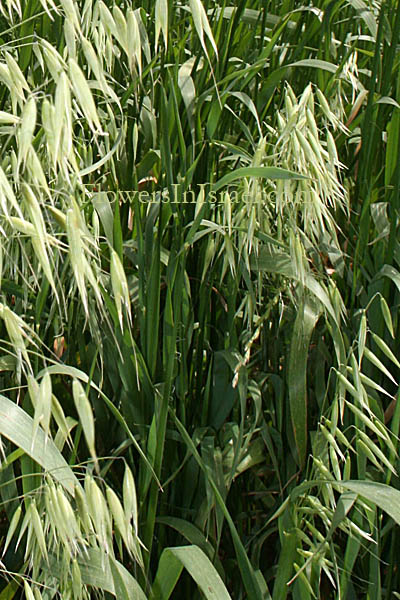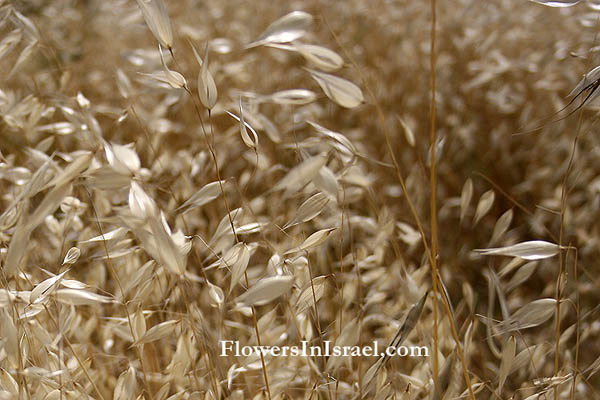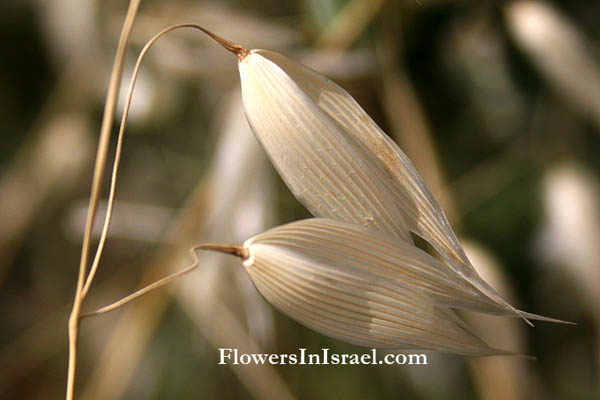Cat Grass, Common Oat, Wild Oat,
Hebrew: שיבולת-שועל תרבותית, Arabic: الشوفان
| Scientific name: | Avena sativa L. | |
| Scientific name: | Avena byzantina K.Koch, Avena fatua L. subsp. sativa (L.) Thell., Avena fatua L. var. sativa (L.) Hausskn., Avena sativa L. var. orientalis (Schreb.) Alef. | |
| Common name: | Cat Grass, Common Oat, Wild Oat | |
| Hebrew name: | שיבולת-שועל תרבותית | |
| Arabic name: | الشوفان | |
| Family: | Graminea (Poaceae), Grass Family, משפחת הדגניים |

|
| Life form: | Therophyte, annual | |
| Stems: | Culms 40-180 cm, erect, unbranched | |
| Leaves: | Alternate, entire; surface scaberulous, rough on both sides; smooth margin, 15–30 cm long, 0.6–1.2 cm wide | |
| Inflorescence: | Panicles 20-40 cm long, 5-15 cm wide, nodding; spikelets 25-32 mm (to 50 mm in naked oats), with 1-2 florets (to 7 in naked oats) | |
| Flowers: | Spikelets comprising 2–3 fertile florets; glumes subequal, 20-32 mm, 9-11-veined; calluses glabrous; lemmas 14-18 mm, usually indurate (membranous in naked oats), usually glabrous, sometimes sparsely strigose, apices erose to dentate, longest teeth 0.2-0.5 mm, awns usually absent, 15-30 mm when present, arising in the middle 1/3, weakly twisted, not or only weakly geniculate; lodicules with a lobe or tooth on the wings, this sometimes very small; anthers 3-4.3 mm; green | |
| Fruits / pods: | Caryopsis; grain adherent to lemma and palea at maturity; the seeds are folk remedies for tumors. The seed contain the antitumor compound b-sitosterol | |
| Flowering Period: | February, March, April | |
| Habitat: | Disturbed habitats | |
| Distribution: | Mediterranean Woodlands and Shrublands | |
| Chorotype: | Cultivar | |
| Summer shedding: | Ephemeral |

Derivation of the botanical name: Avena, Latin for oats. sativa, sown, cultivated; cultivated. byzantina, of Byzantium. fatua, foolish, insipid, worthless. The Hebrew word: שיבולת-שועל, shibolet-shual, oats, from Aramaic: שבלתא, shibalta. Oats are mentioned in the Mishnah Kil'ayim, משנה כלאים א׳:א׳.
It is a weed that’s useless as a cereal crop, but its seeds have always been difficult to separate from those of useful cereals and so tended to survive and multiply from year to year. The only way to remove it was to tramp the fields and hand-weed it. The life cycle of A. fatua is nearly synchronous with that of Common Oat.

|